Best science books 2024: Popular science books to feed your imagination
The best science books evoke a sense of wonder and make you marvel at the incredible world we live in.

The best science book will not just educate; it will also enlighten and entertain. It has the power to transform a dry subject that you dreaded in school into a mind-boggling and captivating story. And it will give you a different perspective on the world around you. However, there are thousands of science books available on a huge variety of topics — which one to choose?
Luckily for you, we have curated a list of the best science books that you should not miss out on — from captivating accounts of the history of the planet and universe, to illuminating insights into the human mind and body. These books make science accessible to all and we think that the list will have something for everyone, whether you are interested in understanding how everyday objects work or the intricacies of how the universe came to be.
We've included a mix of bestselling popular science classics as well as modern releases. This list isn’t a ranking, since each of the books covers a different topic, but each one has something special and unique to offer. So, be prepared to get your mind blown with our list of the best science books.
If you’re after some more specific science knowledge, then our guides to the best physics books and best astronomy books will enlighten you. Or, if you fancy some fiction, then peruse our list of the best sci-fi books.
Best science books
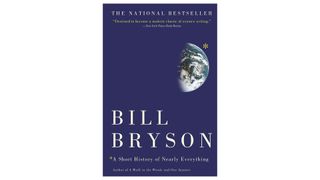
1. A Short History of Nearly Everything
Specifications
Reasons to buy
Reasons to avoid
How did it all begin? And how did we get here? Combining history and science, A Short History of Nearly Everything offers a comprehensive yet entertaining answer to these questions. Written out of dissatisfaction with his own scientific knowledge, Bill Bryson takes the reader on a dazzling journey through the greatest scientific discoveries in history.
Armed with his poignant wit and dry humor, Bryson infuses dry topics with color by telling the stories of discovery through the lives of the scientists who made them. Those quirky, eccentric, competitive, sometimes tragic, but resilient scientists bring the story to life.
Even if you are not interested in science, this book will evoke a sense of wonder about the universe, encourage you to think big, and make you marvel at the incredible world we live in. This book is for anyone eager to learn more about our world and how it came to be.
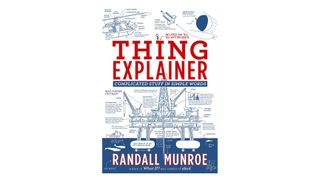
2. Thing Explainer
Specifications
Reasons to buy
Reasons to avoid
How do helicopters work? Or elevators? Or cells? Randall Munroe, the creator of the XKCD webcomic, explains how things work using illustrations and only the most common 1,000 words in the English language. Washing machines become “boxes that make clothes smell better,” airplanes are “sky boats,” and microwaves are “food-heating radio boxes”.
Thing Explainer is an informative and entertaining guide to the science and technology that surrounds us, devoid of confusing jargon. This book will shift your perspective and approach to explanation. So, next time you’ll try to explain how something works rather than merely calling it by its name. A fun must-read for the curious minds who are wondering how things actually work and why.
Best physics books
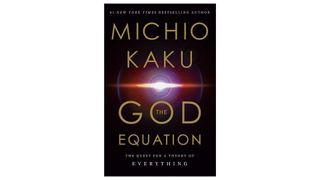
3. The God Equation
Specifications
Reasons to buy
Reasons to avoid
In The God Equation, theoretical physicist Michio Kaku writes about his lifelong mission to find the “Holy Grail of physics:” a theory of everything. A theory to explain everything from the start to the end of the universe, unifying all forces at play.
Sounds like too heavy of a read before bedtime? Rest assured, Kaku writes about this mind-boggling topic in an understandable and engaging way. You’ll get a great historic overview of the major milestones in theoretical physics: both the scientists and the technologies that ultimately led to the development of the string theory — the concept that our universe is made up of tiny threads whose vibrations produce all physical phenomena.
Along the way, Kaku doesn’t lose sight of the practicalities of everyday life and explains how the scientific ideas he presents apply to our daily lives.
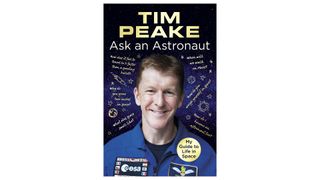
4. Ask an Astronaut
Specifications
Reasons to buy
Reasons to avoid
What does it feel like to fly into space? How do you prepare for it? And what is it like to return back to Earth? In his book, astronaut Tim Peake answers all the questions you never knew you had about going into space. Using an engaging Q&A format, he answers the questions he has most frequently been asked since returning back to Earth after his Principia mission on the International Space Station (ISS) back in 2015-16. The book gives insights into the cutting-edge science, as well as the practicalities and day-to-day life on board of the ISS. The format of the book lends itself to both extensive reading from beginning to end or just a quick read of only a couple of questions and answers. The accompanying illustrations, diagrams, and photos, paired with Peak’s humor and wit, makes this book a great read for armchair astronauts.
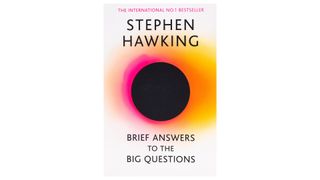
5. Brief Answers to the Big Questions
Specifications
Reasons to buy
Reasons to avoid
Published posthumously, Stephen Hawking’s book tackles 10 of the biggest questions in the universe, for example: Is time travel possible? Is there a God? Will we survive on Earth? The book is the final project of the physicist, who sparked curiosity and fascination for physics among the general public with his best selling books, most notably A Brief History of Time.
Completed after Hawking’s death with the help of his family, friends, and academic colleagues, this book draws on the physicist’s personal archive of essays, lectures, and speeches. It covers big physics concepts such as gravitational waves, the Big Bang, and general relativity, but also doesn’t shy away from addressing topics concerning the future of humanity.
Brief Answers to the Big Questions is a must read for the inquisitive mind curious about the grand questions of the universe. And it certainly instils a sense of wonder and curiosity — to say it in Hawking’s own words: “So remember to look up at the stars and not down at your feet. Try to make sense of what you see and wonder about what makes the universe exist. Be curious. And however difficult life may seem, there is always something you can do and succeed at. It matters that you don’t just give up. Unleash your imagination. Shape the future.”
Best biology books
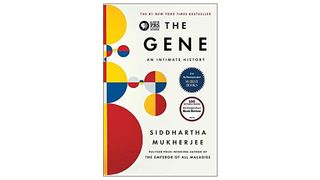
6. The Gene
Specifications
Reasons to buy
Reasons to avoid
Oncologist and 2011 Pulitzer Prize winner Siddhartha Mukherjee distills the complex history of genetics into a gripping and comprehensible narrative. The author takes us on a whirlwind tour describing how the mystery of the gene was slowly unraveled. Starting from the discovery of the gene as the individual unit of heritability thanks to the garden pea experiments of the monk Gregor Mendel, right through to the most recent revolution in biotechnology, genomics, and gene-editing technologies.
The author laces the history of human genes with his personal history of how hereditary illnesses have affected his own family, staying true to his promise of an “intimate” history. Looking towards the future of the human race, Mukherjee questions the implications of our technical capabilities and cautions to keep the ethical implications of the newly emerging technologies in mind. This thought-provoking read is for anyone interested in learning more about the history, biology, and ethics of the units that form the basis of ourselves — our genes.
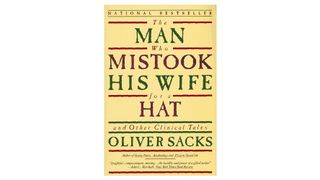
7. The Man Who Mistook His Wife for a Hat
Specifications
Reasons to buy
Reasons to avoid
Neurologist Oliver Sacks takes us on a journey into the devastating, yet fascinating world of neurological conditions. In this collection of medical case reports, considered by some to be Sacks’ finest work, the author recounts the stories of patients with striking neurological conditions affecting their perceptions, emotions, memories, and actions: A musician who has lost the ability to recognize faces or familiar objects; a sailor whose mind is permanently stuck in the year 1945 and cannot form new memories; A woman who has lost the ability to sense the relative position of her extremities.
Rather than portraying his patients merely as interesting cases, Sacks’ paints them as deeply human through his poetic prose and vivid imagery. His storytelling is both compassionate and informative. These essays are more than just neurological case histories, they are, in Sacks’ own words, “clinical tales.” If you enjoy exploring the wonders of the human mind, then this collection of essays is for you!
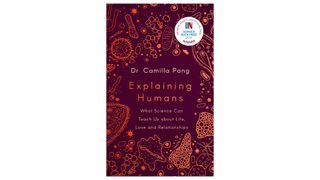
8. Explaining Humans
Specifications
Reasons to buy
Reasons to avoid
Dr. Camilla Pang, who has a PhD in computational biology from UCL, was diagnosed with autism spectrum disorder at the age of eight and attention deficit hyperactivity disorder at 26. As a kid struggling to understand the world around her, Pang asked her mother for an instruction manual to explain humans in order to help her understand and fit in. In a way, she created her own manual on how to human with this book, which won the Royal Society’s science book of the year award in 2020.
In her book, Pang shares how viewing the world through a scientific lens helped her understand and interpret human behavior. Each chapter draws analogies from a different field of science to explain the complexities of human nature, covering a variety of scientific concepts — machine learning, biochemistry, thermodynamics, quantum physics, and game theory. For example, Pang compares emotions to chemical bonds and reflects on how our relationships — just like chemical bonds — go through changes.
Part-memoir, part-manual, the book is an enlightening and insightful guide to understanding the world around us. A must-read for anyone looking to deepen their understanding of humans.
Best paleontology books
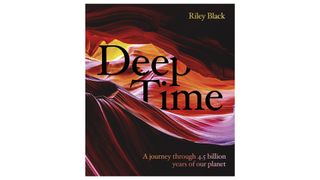
9. Deep Time
Specifications
Reasons to buy
Reasons to avoid
Our planet is ancient. 4.5 billion years old, to be precise. An unimaginable period of time. Riley Black, a science writer specializing in paleontology, takes us on a journey through the geological events that have shaped our planet, making those years palpable and at the same time underscoring the impressive age of our planet.
This book shows the story of our world as we know it, presented in a chronological and visually appealing way. The magnificent photos are supported by bite-sized, easily digestible explanations of key historical moments, like the dawn of the dinosaurs. But this book doesn’t just cover fossils. It also expands on key concepts in geology (the formation of the Grand Canyon), astronomy (the Hubble Deep Field), or biology (mitochondria or evolution).
Deep Time shines light on the traces and artifacts of ancient times that we can still find today, all around us. An informative and beautiful coffee book table to be dipped into rather than devoured in one sitting.
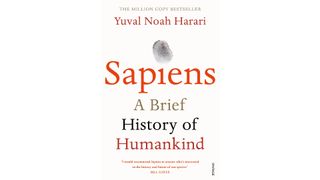
10. Sapiens
Specifications
Reasons to buy
Reasons to avoid
At least six different human species inhabited Earth 100,000 years ago. Today, there is only one — homo sapiens. How did this happen? In his number one international bestseller, history professor Yuval Noah Harari takes us on a journey through the history of homo sapiens.
Harari approaches the mammoth task of telling the history of our species with an engaging and oftentimes provocative narrative and draws on knowledge from history, anthropology, and evolutionary biology. Harari concludes with a skeptical look towards the future, considering our current scientific and technological advances in fields such as genetic engineering and artificial intelligence, which might blur the definition of “human.” While you may not agree with every statement and causal connection inferred, the book will certainly spark thoughts, questions, and reflection on humanities’ past, present, and future.
Sign up for the Live Science daily newsletter now
Get the world’s most fascinating discoveries delivered straight to your inbox.
Mihaela Bozukova is a science journalist based in Germany. She holds a Ph.D. in molecular and computational biology from the Max Planck Institute for Biology of Ageing and the University of Cologne in Germany. She is passionate about making science accessible to everyone. You’ll find her covering a variety of life science topics for outlets such as Massive Science, Laborjournal and Microbites.

Phaistos Disk: 3,000-year-old inscriptions from Crete that have never been deciphered

The biggest supermoon of the year is about to rise: When to see the 'Hunter's Moon' at its best and brightest

Bear hair and fish weirs: Meet the Indigenous people combining modern science with ancestral principles to protect the land